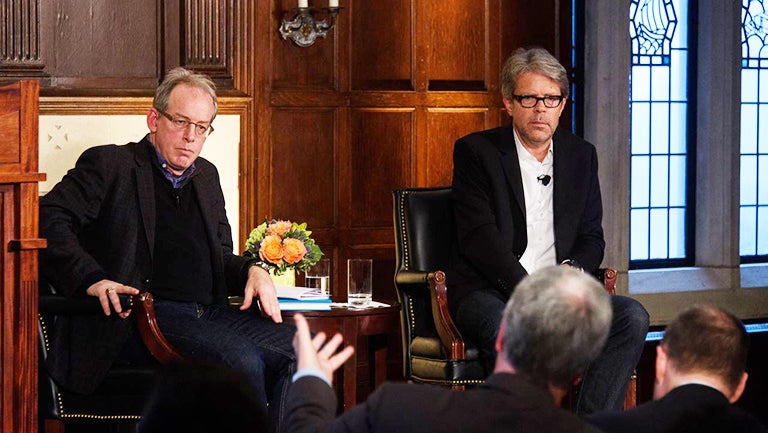Title: Author Jonathan Franzen Talks About Faith at Georgetown Lecture Series
Critically acclaimed author Jonathan Franzen converses with Berkley Center Senior Fellow Paul Elie for a Faith and Culture Lecture Series event reflecting on the author’s life and writing.

Critically acclaimed author Jonathan Franzen recently sat down with Berkley Center Senior Fellow Paul Elie for a Faith and Culture Lecture Series event reflecting on his life and writing.
During the conversation, Franzen opened up about his complex relationship with religion.
“I had this singular experience of being in a Christian youth group for almost six years that I was intensely involved with, but I left it all behind when I came to literature,” recalled Franzen, author of The Corrections, which won the National Book Award in 2001, and four other novels.
Later in life, especially in times of distress, Franzen found himself coming back to his faith.
“The worst year of my life was spent in Philadelphia, the city of brotherly love,” the author explained. “I started feeling hunger for religion in a way I hadn’t since my teenage years. I was really miserable and needed to find faith. I had to try to believe in something.”
Exploring Religious Uncertainty
Though his relationship with personal faith ebbed and flowed, Franzen said he has an immense respect for religion’s role in art and literature.
He said Fyodor Dostoevsky’s religious undertaking of his novels and the lack of a dogmatic attempt to indoctrinate his reader was inspiring.
“‘The Grand Inquisitor’ [poem] was state of the art. No one had ever made a better case against the Christian church than Dostoevsky did in his religious work of art, The Brothers Karamazov,” he remarked.
Franzen has employed similar techniques of embedding challenges to his political and religious beliefs in his own novels.
In his 1992 book Strong Motion, for example, Franzen created a fundamentalist preacher, who despite not being the protagonist of the story, evoked sympathy and made what Elie said was a compelling case for a pro-life position.
“Even though my sympathies were with the good, liberal kids in that book, it seemed important to do whatDostoevsky had done,” Franzen explained. “He couldn’t write a piece of propaganda. For the same reason, I felt it was important to push back against a certain knee-jerk leftist dismissal of everything that the activist churches of that moment were saying.”
Finding New Things
The key to good, realistic fiction, Franzen said, lies in the connection between the story and the author’s own experiences.
“When an author is writing a new book, they’re really reflecting on their own life and finding new new things within themselves,” Franzen said.
He compared this process of writing with the religious experience of representing God.
“There’s a paradox in autobiography within your novels, because once you get to the really personal, hot core, it’s similar to representations of God,” he said. “It cannot be approached directly. So you end up pouring all of that emotional heat into images and symbols through different characters in your novel.”
Human Unhappiness
Franzen also discussed his role as a “large audience” author, meaning his novels are often set in the bourgeois milieu rather than on the fringes of society.
He recalled the late David Foster Wallace, a writer and a close friend of his, calling him moderate compared to many other artists.
But for Franzen, “art does not dwell at the extremes of utter conviction, but rather lies somewhere in the uncertain middle.”
He said his books try to tackle the question of human unhappiness.
“People who have the fundamental elements of life to be happy still somehow aren’t, and that’s what I’m trying to get at in my novels,” he said. “If everyone is happy, there is no story.”